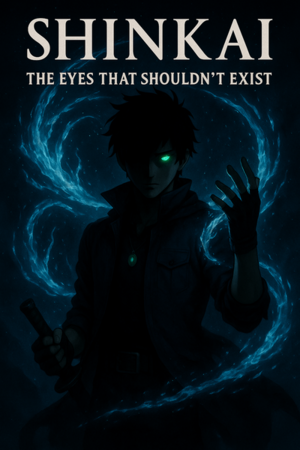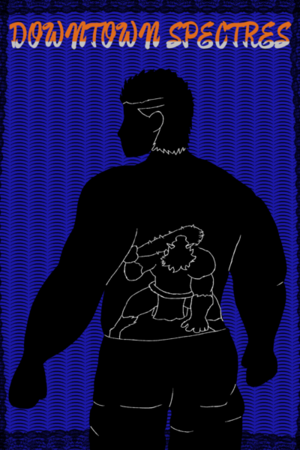Chapter 8:
Belief to Proof
Ashes of Eden: The Serpent’s Return
Shelby’s Apartment, Los Angeles, 2025
POV: Naga
Morning sliced Shelby’s apartment into stripes. The blinds were crooked, letting light in where they shouldn’t and jamming where they should’ve moved.
The city outside kept its low, constant growl. I could faintly hear engines idling, a siren far away, someone arguing on the sidewalk.
Her place smelled like reheated coffee and paper. The kind of paper that gives up when you underline a word too many times. Anything was better than Eden’s airless cold.
Shelby moved around the kitchenette like she’d done it half-asleep all her life. T-shirt washed to a ghost, shorts with strings she hadn’t cut off, and hair tied up with an elastic band.
She poured coffee into a stained mug, slid it across the counter toward me, then topped up her own.
A thin black rectangle lit up and buzzed against a coaster. A face flashed and vanished. Letters climbed the glass and fell off the edge. The thing shivered again and went still, like a creature pretending to sleep.
I pointed. “What is that.”
She glanced over and smirked. “You’re kidding.”
“No.”
“It’s a phone,” she said, tapping it awake. Colors, icons, a tiny map with a blue dot that pulsed like a heartbeat. “You talk into it, it talks back. You point it at things, it remembers. It’s a camera, a clock, a flashlight, a newspaper, anything you want really.”
“Is it alive?”
“Only in the ways that make you hate it.” She thumbed it dark and nudged it away like it might bite.
I sat in a chair by the window, and Shelby sat on the couch with one foot on the cushion and one heel braced on the floor. The table between us had been buried in maps and papers, notebooks open to pages that had arrows pointing at other arrows.
She watched me over the rim of her mug. “So how can you speak English but not know what a phone is?”
“I know every language. It’s one of my divine blessings.”
“So you’re really the devil then,” she said, casually. “You are, right?”
I kept looking at the dead glass. It reflected us back, barely. There was no point in hiding it.
“I am. But not in the traditional sense you humans have painted me out to be. Were you expecting big red horns?”
She let the quiet stretch until it was useful, then cut it. “Okay. Real question. Why are you so desperate to find this angel?”
I supposed she’d ask eventually.
“Haneul.”
“Sorry, Haneul.” She lowered the mug, fingers curled around the ceramic. “Every time you say her name your face changes.“
I should have said nothing. It’s easy to keep the worst parts of yourself behind your teeth if you just don’t move your mouth.
“In Eden, night never ended,” I said. “It pretended to. But it was the same loop. Same path, same trees, and the same silence. I spent thousands of years there, trapped.”
Her eyes didn’t flick away. Her chin tilted a millimeter like she was trying to see Eden through me.
“I wasn’t a person there,” I said. “I was a curse, the origin of human sin. And then she came through the gate like it was a door in a house, and everything changed.”
“What changed,” Shelby asked.
“She looked at me and didn’t flinch,” I said. “She talked to me like I was someone worth something. She laughed at things that weren’t funny until they were. She believed me, when the heavens spent eons denying me.”
Shelby set the mug down. She didn’t breathe for a second. “Believed you… how?”
“That I could be more than what the world made me,” I said. “That the worst thing about me wasn’t the only thing. That if I reached out, there’d be something to hold.”
The truth I didn’t say sat in my throat like a stone, the thought that maybe she shouldn’t have.
I knew what I’d done before Eden. I was not good. I was not noble. If anything deserved to be locked away, it was me. The world was perfect until me. It was me who released sin unto mankind.
“She kissed me,” I said instead, “and the seal broke. I fell into this city. And now when I breathe deep enough, I catch a thread of her under the smell of smoke and engines. Not all of her. Blood. Something that shouldn’t be here. Somebody here has her.”
Shelby’s mouth twitched. Not into a smirk. Into something like recognition that hurt and healed all at once. “Yeah,” she said quietly. “I get that.”
“How,” I asked.
“Because believing is the only thing I’ve had for years,” she said. “And nobody ever gave it back.”
She shifted off the couch arm to the cushion and sat forward, elbows on her knees. “My mom and little brother were murdered when I was thirteen. I was at school. I came home to tape on the door and cops with their hands on their belts. My dad was sitting on the steps in cuffs, blood on his shirt.”
The fridge hummed and clicked off like it was holding its breath for her.
“They said there was no sign of forced entry,” she said. “The trial took less than a week. My father was put on death row, executed. I visited him near the end. He asked if I was eating. Told me to do my homework. Then he told me it wasn’t him, and he said it with this… tiredness, like he’d been using those words as bricks to build a house and kept getting told to move every time he was almost done.”
She moved her thumb around the mug’s rim until it squeaked. “He said a demon did it. Not a metaphor. He literally meant something came into our house and tore my family apart that night. He told the public defender. We told my aunt. I told anyone who’d listen. Nobody believed him. Nobody believed me. Crazy runs in the family, they said.”
My eyes stayed on the table, silence filling the warm apartment.
“They gave him the chair,” she said, voice flat now, because if she gave it any more curve it would break. “He died politely, on schedule, in a room with witnesses. After that, every time I closed my eyes, all I could hear was him saying ‘It wasn’t me.’ So I did the only thing that made the noise less. I started looking for a world where he could be telling the truth.”
She flipped a notebook toward me. Scans of parish records with edges burned black, clippings of newspaper. “I found… scraps. Old stories about vampires that read like messy crime scenes. Priests writing about things in rafters and people waking up speaking in voices they didn’t own. Most of it reads like nothing but crazy ramblings. Some of it reads like the world cracking open for a second and nobody knowing how to say it.”
She pulled the notebook back. “I didn’t come across Malice in any of that. But if your nose says those two worlds meet in the middle, then I finally have a bridge. From blind belief to proof.”
We let the apartment take the weight. Pipes ticked. So that’s why she was so eager to help me. For the first time in her life, she’d found proof that she wasn’t wrong. That her father was not a killer.
“You were the only one who believed him,” I said.
“Like how you had Haneul,” she said, meeting my eyes. “She was the first person who believed you weren’t just the worst thing people said you were. That matters. More than people who haven’t needed it understand.”
It landed like a truth I’d known but never named. If just one person believes you, the floor stops moving. Just enough to stand on.
The phone buzzed again. She checked it and tossed it back on the counter.
“You ever think she was wrong,” Shelby asked suddenly. “Haneul. You ever think she was wrong for believing in you?”
“Yes,” I said, before I could make the answer pretty. “I think it every day. I think it when I wake up and dream about what I’ll do to the people that have her. I think it when I want to be believed again even though I know I don’t deserve it.”
She let out a breath through her nose. “Thanks for not trying to sell me a saint.”
“I won’t,” I said.
“I know.” She nodded to herself, like she’d needed to hear that as much as I’d needed to say it.
“Why do you believe your father,” I asked. “Why do you choose that version of him.”
She stared at the blinds a long time. The stripes of light had crawled halfway across the floor by then.
“I remember how he held a plate,” she said finally. “Left hand under, right hand on top, thumb tapping the edge. He didn’t do it the day I visited. He sat perfectly still. The only time I ever saw him that still was when he was trying not to cry in church.” Her mouth tried to smile and failed. “I don’t think I ever needed any evidence. He was my father.”
That was an answer that would never stand up in court and never needed to.
“Eat,” she said suddenly, deflecting before she could shatter. She stood, opened a cabinet and produced bread, eggs, and a frying pan that looked to have survived wars. “You’ll starve to death if you never eat.”
“I do eat.”
“Then eat.”
She cooked up a meal and then slid a plate across to me with both hands like she didn’t trust the table to do the job. I cleaned the whole plate. Maybe because she watched me like she would be personally offended by any leftovers.
While we chewed, the phone buzzed again.
“You’ll have to use a phone eventually,” she said.
“Why.”
“Because this is how humans communicate now, not through pigeons.” She stood, grabbed the phone, and thrust it at me.
It was heavy in a way that didn’t make sense. Slippery. Warm from her palm, which was warmer than I expected.
She opened a message thread. It was all short lines and time stamps and a tone that matched Makoto’s posture.
Tonight. Envy. 21:00. No punctuation.
“It’s Makoto, type something,” she said.
“Type what.”
“Received,” she said. “Or okay. Or we’ll be there. Anything, just don’t write a poem.”
I glossed my fingers over the glass for letters and touched them one by one.
we’ll be there.
The apostrophe took three tries.
She grinned. “Look at you. Part of the modern world.”
“I don’t like it,” I said.
“Oh, yeah,” she said. “Wait ‘til you find out about the internet.” She took the phone back and set it by the sink.
“Go take a shower, Naga,” she said, already pulling a towel off a hook.
“I took one yester—”
“Take another one,” she said, shoving the towel into my hands.
The bathroom was narrow, bright, and clean in the way that comes from scrubbing something while you think about things you can’t fix.
When I came out from the shower, she had made room on the table by grouping the paper into stacks with names. She also found the black leather jacket she’d bought me from the thrift store on my first day.
“Put it on.”
“Do we have to wear similar jackets?”
“Yeah, it’s cute,” she said, smiling at her own outfit in the mirror. “We’ll get you some new clothes tomorrow.”
I pulled the jacket on. It made me wonder how long this arrangement would last. I mean, I couldn’t just stay with Shelby forever right? She had her own life to live.
“Passable,” she said.
“Very helpful.”
“That’s what I’m here for.”
We fell quiet again. It was the kind of quiet that let two people breathe in the same room and not lose any air.
“You said Haneul believed you,” she said eventually. “What did you believe about yourself before she did?”
“That everything bad in this world comes from me.”
“And now?”
“I don’t know,” I said. “Some days, I think she was wrong about me. Some days, I want to be the person she saw. Those two thoughts don’t like to share a room.”
“Then make them.”
She stood and crossed to the window and lifted the blinds an inch. Noon light washed the street to bone. The city kept being the city, indifferent and kind in the same breath.
“I used to think proof would feel like relief,” she said without turning around. “All these years of digging, I thought the day I found out I wasn’t crazy would be the day I slept. But it isn’t. It feels like opening a door and realizing the room past it is way bigger than the house.”
“How do you know you’re walking up the right house,” I asked.
“I don’t. But I’ll keep walking,” she said, dropping the blinds. “I’m good at walking.”
She checked the time on her phone.
“You should rest,” she said. “Close your eyes. I’ll wake you. If I fall asleep first, wake me.”
“I don’t really—”
“Try,” she said. “Sleep is stubborn. It takes pieces of you if you don’t meet it halfway.”
I leaned back, let my eyes fall, and listened. Pipes. Footsteps above. Pages turning. Her pen scratching. The small click of the mug being set down exactly where it had been before.
I opened my eyes to the same room, the same stripes, the same woman underlining a word until it couldn’t take any more ink.
“What if we don’t find anything tonight,” she asked.
“Then tomorrow,” I said. “And the night after that.”
Her lips curved into a worried smile. “And if we do find something?”
“Don’t worry, I won’t let anything happen to you.”
She half-smiled. “Okay.”
She grabbed her boots from the door. The soles were chewed up, the laces mismatched. “We leave at eight-thirty. If you can nap, nap.”
I didn’t nap. I watched her tidy chaos into neat piles, then explode it again when a new thought elbowed in.
At seven, she pushed the phone into my hand again. “Practice,” she said. “Text me from across the room.”
“Why.”
“Because it’s funny.”
I typed: stop watching me and hit send. Her spare phone buzzed. She looked at me over the edge of it with a grin.
“Creep,” she teased.
“You told me to.”
“That’s what all creeps say.”
Around eight, the light outside peeled itself off the buildings and took the heat with it. The city switched from day to night.
“Ready?” she asked.
“Yeah.”
She paused in the doorway. “Hey,” she said without turning. “Haneul believed in you first. But it doesn’t have to be the last time someone does.”
“You, too,” I said. She’d reminded me of the reason I was doing this to begin with.
This world thought it could take Haneul from me and keep breathing. It was wrong. I’d follow the ones who did this through every alley, and every lie. And if the trail ended in fire, then so be it.




Please sign in to leave a comment.